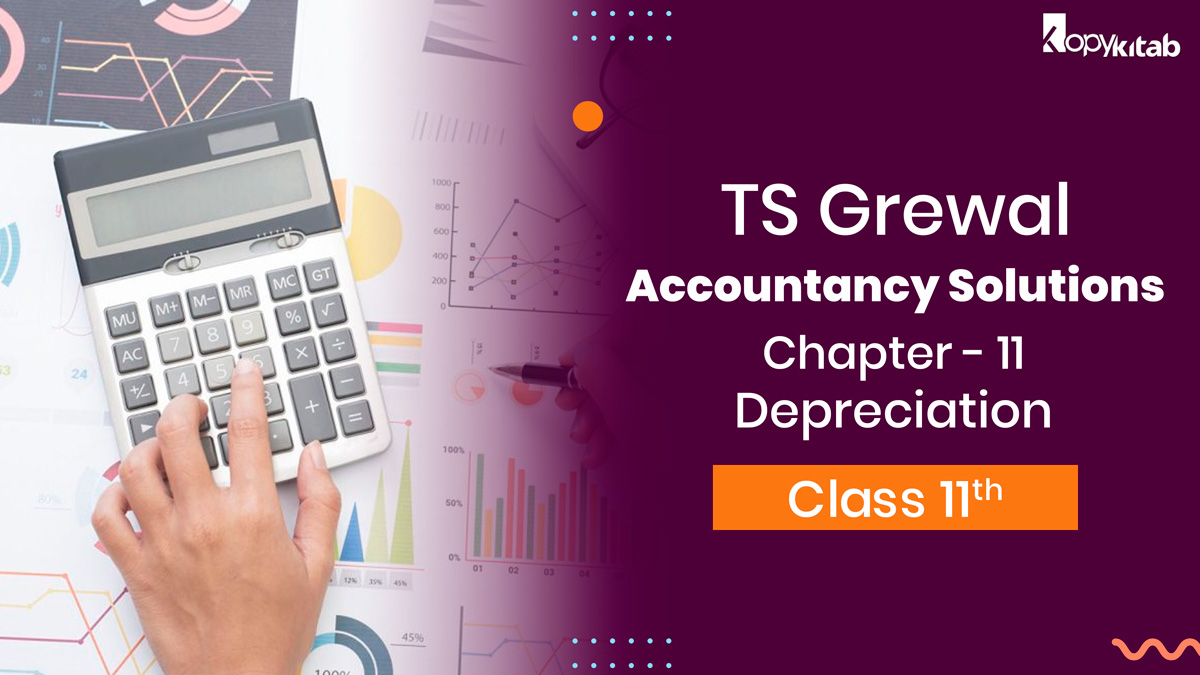
TS Grewal Class 11 Accountancy Solutions, Chapter 11- Depreciation, is explained in a detailed way and accurate with the help of subject experts. Class 11 students will not face any trouble comprehending the meaning of the chapter as TS Grewal is written for the sole purpose of making the text easier.
- Read More: TS Grewal Class 11 Solutions
Download Free PDF For TS Grewal Class 11 Accountancy Solutions Chapter 11 – Depreciation
TS Grewal Class 11 Accountancy Solutions Chapter 11
Detailed Explanation Chapter 11 – Depreciation, TS Grewal Class 11 Accountancy Solutions
- TS Grewal Class 11 Accountancy Solutions, begins by defining depreciation as the dissolution of a fixed asset value because of its time, usage, obsolescence, etc. It includes terms like Amortization, Obsolescence, and Depletion.
The main characteristics of Depreciation are:
- It is a decrease in the value of a book of fixed assets.
- It refers to the loss of assets value because of time or expiration.
- It will continue until the asset ends.
- The causes of depreciation as per TS Grewal Class 11 Accountancy Solutions are as follows:
- Physical wear and tear, like a property beyond repair and should be disposed of.
- Obsolescence, i.e., replacing the old equipment with the new ones, hence decreasing the use of the old equipment.
- Expiry of user rights means when an assets’ lifespan expires, so does its user’s right of using it.
- Factors affecting depreciation are mentioned below:
- Assets’ price.
- Estimated salvage or residual value, which is the amount of money a company expects to cover, the dates on which goods are sold, or cleared, and the disposal cost.
- The useful period of assets, i.e., until they can be used by a company.
- Methods to calculate depreciation:
- a) Straight Line Method or SLM:
It is an easy way of calculating depreciation in which a reduced amount of depreciation is charged annually, during the life of an asset. The actual cost of an asset includes the annual depreciation charge and is maintained year on year. It is also known as ‘Fixed Input Method’ or ‘Real Cost Method’.
- b) Written Down Value or WDV
Under this method, depreciation is charged annually on the book value of assets. The WDV declines with the decrease of books. It means the annual decline also continues to decline with it. WDV method is also known as ‘Reducing Input Method’ or ‘Reducing Measurement Method’. This method is also recognized by the Income Tax Department.
TS Grewal Class 11 Accountancy Solutions has elaborated all the concepts easily and mentioned all the formulae necessary for solving the numerical problems.
TS Grewal Class 11 Accountancy Solutions Chapter 11: Sample questions
Using the SLM, calculate the rate of depreciation from the following:
Purchased a second-hand washing machine for Rs. 96,000, spent Rs. 24,000 on its cartage, repair & installation. The estimated useful life of the machine is 4 years. The estimated residual value is Rs. 72,000.
Answer:
- Amount of Depreciation = (cost of machine – scrap value of machine)/life in years
= (1,20,000 – 72,000)/4 = Rs. 12,000
- Rate of Depreciation = (Amount of Depreciation/Cost of machine) x 100
= (12,000/1,20,000) x 100 = 10% p.a.
We have included complete information regarding CBSE TS Grewal Class 11 Accountancy Solutions Chapter 11 – Depreciation. If you have any questions feel free to ask in the comment section.
FAQ’s: TS Grewal Class 11 Accountancy Solutions Chapter 11 – Depreciation
What are the disadvantages of SLM?
The disadvantages of SLM are mentioned below:
1. Determining the exact degree of depreciation is difficult.
2. Asset value, in this method, will never be zero.
Mention the main characteristics of depreciation.
The main characteristics of Depreciation are:
1. It is a decrease in the value of a book of fixed assets.
2. It refers to the loss of assets value because of time or expiration.
3. It will continue until the asset ends.
Mention the causes of depreciation.
The causes of depreciation are mentioned below:
1. Physical wear and tear, like a property beyond repair and should be disposed of.
2. Obsolescence, i.e., replacing the old equipment with the new ones, hence decreasing the use of the old equipment.
3. Expiry of user rights means when an assets’ lifespan expires, so does its user’s right of using it.
Can I download TS Grewal Class 11 Accountancy Solutions Chapter 11 – Depreciation PDF for free?
Yes, you can download TS Grewal Class 11 Accountancy Solutions Chapter 11 – Depreciation PDF free.
